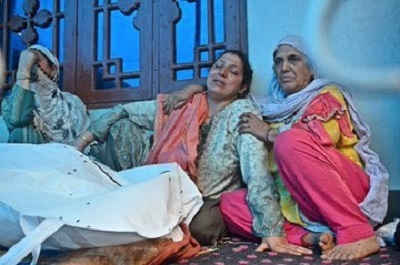New Delhi, (Samajweekly) As a five-judge Bench of the Supreme Court upheld the abrogation of Article 370 by the Centre, Justice Sanjay Kishan Kaul recommended setting up a Truth and Reconciliation Commission to look into human rights violations by state and non-state actors in J&K.
Why the commission is important for the people of J&K, especially Kashmir, has also been expressed by Justice Kaul in his ‘epilogue’ to the judgement.
“We, the people of Jammu and Kashmir, are at the heart of the debate,” Justice Kaul said, which, perhaps, articulates justifiably what the people of J&K have been trying to say for decades.
Since the late 1980s when terrorist violence took root in Kashmir, thousands have died. Lakhs of people were forced to abandon their homes. There are no concrete numbers of deaths, but almost each and every family in the valley has a sad tale to narrate.
Someone fell to terrorists’ bullets, some died in cross-firing, some were tortured to death, some were left maimed, many women were raped and gang-raped, thousands were abused, houses looted and burnt, many left homeless, families torn apart and hundreds are still missing. Neighbours became suspects and friends the mole for the terrorists. The valley has a lakh of heart-wrenching tales.
Religion was used to justify violence and thousands of youths were made paid stone pelters. Hundreds of school buildings were burnt, temples desecrated, government buildings targeted, and the place was turned into a total war zone. The Pakistan-backed separatist leaders would set up protest calendars which had to be followed on the threat of guns. They were running almost a de facto government even when the official reins were in the hands of either the Abdullah family or the Muftis. Separatist leaders were ‘revered’ and terrorists could enter and live in any house and do whatever. No one complained.
But all this changed with the abrogation of Article 370 and the strong action against the separatist leaders and the Pakistan-sponsored terror network.
With the hauling up of the separatist leaders like Yasin Malik, their sinister designs have been exposed. These leaders swindled money, built palatial homes and other properties in J&K, other cities and even countries. Their children were the best educated and got good jobs while common youths were goaded to take up guns, pelt stones for a cause that was fetching them money and power.
The crackdown by the NIA, ED and other agencies, and banning of outfits like the Jamaat-e-Islami have helped in establishing peace in the valley. People are no longer falling for their diktats, and Kashmiris now know how they have been misled by these leaders on the pretext of religion and so-called ‘azadi’.
No longer are protest calendars made, no longer do the youth indulge in stone pelting and no longer are the terrorists able to create mass hysteria.
The decades of violence and false narrative perpetrated and pursued by the Pakistan-sponsored separatist-terrorist network dealt a major blow to the social fabric. It ripped apart communities who had been coexisting peacefully earlier, created distrust, led to anger and more violence and finally pushed a big number of youths into drug addiction.
Stressing on the need to come out of the decades-old ordeal. Justice Kaul said, “In order to move forward, the wounds need healing. What is at stake is not simply preventing the recurrence of injustice, but the burden of restoring the region’s social fabric to what it has historically been based on – coexistence, tolerance and mutual respect.”
For healing the wounds which have been there for the last three decades, Justice Kaul recommended the setting up of an impartial Truth and Reconciliation Commission which will investigate and report on the violations of human rights both by the state and non-state actors perpetrated in Jammu and Kashmir at least since the 1980s and recommend measures for reconciliation.
Justice Kaul suggested a commission like South Africa’s Truth and Reconciliation Commission, which was set up to investigate human rights violations perpetrated during the apartheid regime. It served as a means of reckoning or catharsis for the victims and fostered peace-building.
In the past, calls for setting up a Truth and Reconciliation Commission have been echoed by different sections in Kashmir. In March 2011, Omar Abdullah as the Chief Minister, had suggested setting up a Truth and Reconciliation Commission (TRC) to probe the deaths and destruction in militancy-related violence in Jammu and Kashmir. He made a similar demand in 2015 for addressing the issues related to both the Kashmiri Pandits and the Muslim communities. But beyond the statements, nothing happened.
Various Kashmiri Pandits have also been demanding the setting up of Commissions, but so far no government has paid any heed.
Now with the Supreme Court putting forth the suggestion, the Centre needs to consider it.
Even though the SC recommendation has come three decades late, it is better late than never. Justice Kaul also said that this Commission should be set up expediently before memory escapes.










